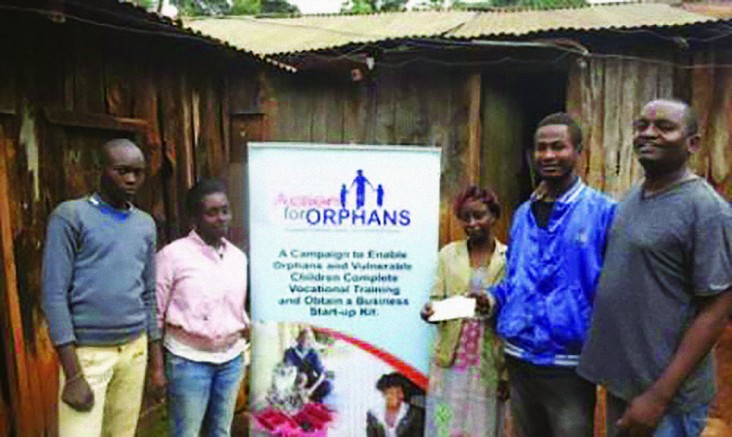- Work With USAID
- How to Work with USAID
- Organizations That Work With USAID
- Find a Funding Opportunity
- Resources for Partners
- Careers
- Get Involved
Speeches Shim

Background
The goal of Yetu, which means “Ours” in Swahili, was to build the capacity of Kenyan civil society organiza-tions (CSOs) to engage citizens to reach their missions. Yetu built local civic engagement capacity by building alliances between CSOs, foundations, and businesses to mobilize at least $1 million in assets for local development needs, improving organizational capacity of Kenyan CSOs, and improving Kenya’s cultural and technological environment for community philanthropy.
This program supported Kenyan CSOs to build and deliver targeted community engagement efforts through awareness-raising materials, fundraising drives, and sustainably building their organization’s capacity. A cutting-edge online and mobile philanthropy platform was designed to reduce philanthropic transaction costs and engage a younger, more tech-savvy population in local philanthropy.
Yetu conducted organizational capacity assessments and supported 23 CSOs to develop, implement, and monitor institutional strengthening plans (ISPs) as well as resource mobilization plans. In addition to building these 23 partnerships, Yetu supported an additional 85 CSOs to improve their capacity through courses, boot camps, regional workshops and other trainings provided through the Yetu Initiative.
Faith-Based and Community Initiatives
The Yetu Initiative works with a myriad of CSOs, such as the Kenyan Community Development Foundation (KCDF). Also, one of Yetu’s core grantees is the Brothers of St. Joseph’s, a religious Congregation of Brothers in the Catholic Church based in Mweiga Nyeri Kieni West District, Central Province, Kenya, under the Archdiocese of Nyeri. Through their work with Yetu, Brothers of St. Joseph’s strengthened their ability to mobilize local assets in support of their work in the community. The Brothers of St. Joseph’s was formed to provide a community-based link to facilitate integrated interventions that would help improve the quality of life for orphaned and vulnerable children.
The Brothers of St. Joseph’s was among the top five grantees in 2015 through a competitive call for participation in the Yetu Initiative that attracted over 300 applications. This Initiative’s intent is to support longer-term local development needs via community philanthropy. It has established a number of funding partners, including: the East Africa Association of Grant Makers, Nation Media, Diamond Trust Bank, Global Giving, Safaricom Foundation, and others.
Results
As of June 2017, 4,716 contributions were made through the yetu.org e-philanthropy platform. As of August 2017, campaigns supported by Yetu raised $390,000 in cash, in-kind donations, and volunteer time from individuals, corporations, foundations and local government for local development needs. Far surpassing the original target of 5 million positive messages on social media, Yetu and its CSOs have garnered 21,868,297 positive messages as of June 2017.
Yetu enabled CSOs to draw on each other’s strengths. For example, Omega Foundation and St. Joseph’s have engaged their partner CBOs to participate in their community campaigns. A total of 20 CSOs have completed or are halfway through a campaign cycle with support from Yetu, implementing different fundraising strategies with traditional and digital media marketing techniques. They have also established relationships with corporate partners that are willing to continually work with them.
Conclusion
The program continues to build the capacity of CSOs in Kenya, helping grow their fundraising campaigns and training more CSOs. In order to build capacity with faith-based and local CSO partners, it is critical to understand the differences between FBO’s governance and systems, which might differ from CSOs. In the case of the Brothers of St. Joseph’s, the brotherhood could only make certain decisions in consultation with church leaders, which had to be accounted for in programming. It was also very important to be sensitive to FBO’s religious traditions and practices. For instance, when Yetu Initiative team members met with St. Joseph’s, they were required to share a meal with the brothers. Finally, in attempting to mobilize community assets for development, it is critical to recognize and build on the trust that FBOs and religious institutions have in many communities. Local FBOs have great capacity to build a base of committed volunteers with the influence of religious leaders. However, the example of St. Joseph’s also shows that FBOs could benefit from more knowledge regarding project management and fundraising. Acquiring this knowledge can help them move past potential barriers and grow their work. Community philanthropy initiatives such as the Yetu Initiative are therefore vital to unlock the potential of CSOs and FBOs working and mobilizing funds for communities.

Comment
Make a general inquiry or suggest an improvement.